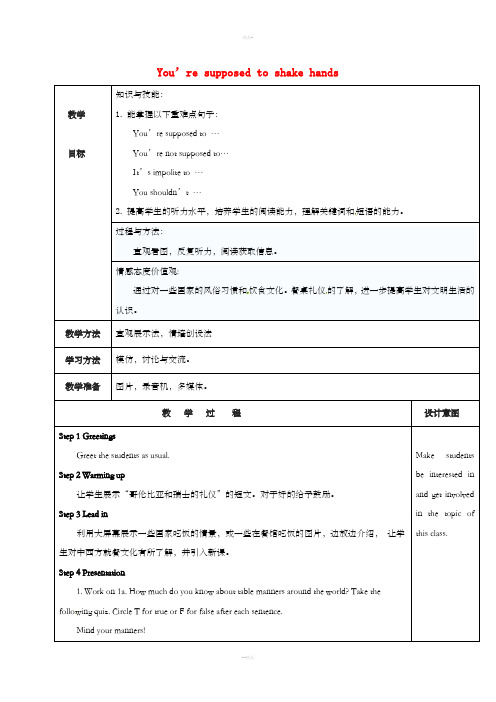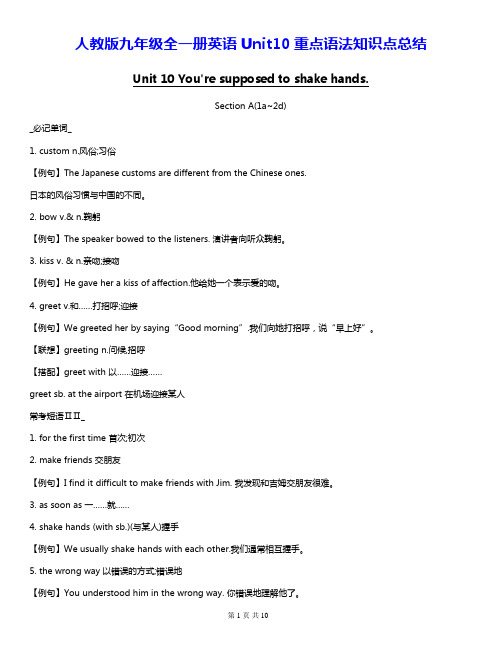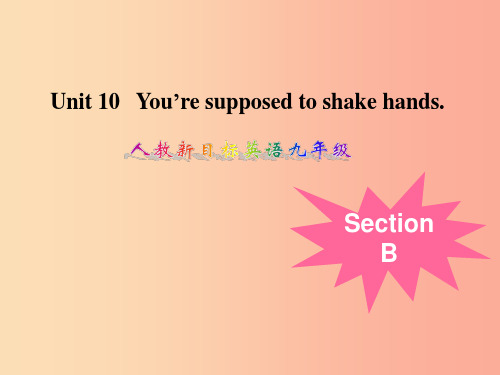【九年级】英语全册Unit10You’resupposedtoshakehands学案1无答案新人教
九年级英语全册Unit10You’resupposedtoshakeh

九年级英语全册Unit10You’resupposedtoshakehUnit10 You’re supposed to shake hands.Section B (3a—Self Check)Learning goals:⼀、语⾔知识(常⽤词汇、短语和表达)1. on an exchange program2.be supposed to do3.be excited about…4.give sb. some suggestions and advice about…5.go out with…6.look forward to doing…7.show up8.be worth doing…9. in different situations 10.knock on 11. make sb.+ adj. 12.it’s + adj. + to do sth.⼆、语⾔功能1. Talk about different customs at home and abroad.2 能运⽤所学语⾔知识及be supposed to do 句型来谈论中西⽅⽂化和风俗习惯。
三、学习策略能让学⽣有意识的运⽤“be supposed to do/ it’s polite to do…”这⼀⽬标语⾔,谈论中西⽅⽂化和风俗习惯。
同时还启发了学⽣从所学的⽬标篇章中吸取供模仿写作的句型和表达,进⽽提⾼⾃⼰的写作能⼒四、情感态度引导学⽣了解各地不同的⽂化习俗并尊重各地的风俗习惯。
【设计意图】⽬标引领,表述了本节课的知识、能⼒和情感⽬标。
尤其突出对写作能⼒的要求和培养, 做到有的放⽮,增强课堂学习的针对性和时效性。
Teaching and learning stepsStep1. Pre-writing activities1. ReviewⅠ.Please translate the following sentences into English .1)他们尽最⼤努⼒使我感到宾⾄如归。
九年级英语全册 Unit 10 You’re supposed to shake hands Sec

You’re supposed to shake hands教学目标知识与技能:1.能掌握以下重难点句子:You’re supposed to …You’re not supposed to…It’s impolite to …You shouldn’t …2.提高学生的听力水平,培养学生的阅读能力,理解关键词和短语的能力。
过程与方法:直观看图,反复听力,阅读获取信息。
情感态度价值观:通过对一些国家的风俗习惯和饮食文化。
餐桌礼仪的了解,进一步提高学生对文明生活的认识。
教学方法直观展示法,情境创设法学习方法模仿,讨论与交流。
教学准备图片,录音机,多媒体。
教学过程设计意图Step 1 GreetingsGreet the students as usual.Step 2 Warming up让学生展示“哥伦比亚和瑞士的礼仪”的短文。
对于好的给予鼓励。
Step 3 Lead in利用大屏幕展示一些国家吃饭的情景,或一些在餐馆吃饭的图片,边放边介绍,让学生对中西方就餐文化有所了解,并引入新课。
Step 4 Presentation1. Work on 1a. How much do you know about table manners around the world? Take the following quiz. Circle T for true or F for false after each sentence.Mind your manners!Make students be interested in and get involved in the topic of this class.1. In India, you’re supposed to eat with your hands. T F2. In China, you’re not supposed to stick your chopsticks into the food. T F3. In Korea, the youngest person is expected to start eating first. T F4. In France, you’re supposed to put your bread on the table. T F5. In China, it’s impolite to use your chopsticks to hit an empty bowl. T F1)先让学生自己做,老师指导,让他们理解每个句子的意思。
人教版九年级全一册英语Unit10重点语法知识点总结

人教版九年级全一册英语Unit10重点语法知识点总结Unit 10 You're supposed to shake hands.Section A(1a~2d)_必记单词_1. custom n.风俗;习俗【例句】The Japanese customs are different from the Chinese ones.日本的风俗习惯与中国的不同。
2. bow v.& n.鞠躬【例句】The speaker bowed to the listeners. 演讲者向听众鞠躬。
3. kiss v. & n.亲吻;接吻【例句】He gave her a kiss of affection.他给她一个表示爱的吻。
4. greet v.和……打招呼;迎接【例句】We greeted her by saying“Good morning”.我们向她打招呼,说“早上好”。
【联想】greeting n.问候,招呼【搭配】greet with 以……迎接……greet sb. at the airport 在机场迎接某人常考短语ⅡⅡ_1. for the first time 首次;初次2. make friends 交朋友【例句】I find it difficult to make friends with Jim. 我发现和吉姆交朋友很难。
3. as soon as 一……就……4. shake hands (with sb.)(与某人)握手【例句】We usually shake hands with each other.我们通常相互握手。
5. the wrong way 以错误的方式;错误地【例句】You understood him in the wrong way. 你错误地理解他了。
6. hold out 伸出(手等)7. greet each other 互相问候8. to one’s surprise 令某人惊讶的是经典句型ⅢⅡ1. That's how people in Japan are expected to greet each other.那就是在日本人们互相问候的方式。
人教版初中英语九年级全册Unit 10 You’re supposed to shake hands

10-(9)了解并跨文化交际(恰当使用)。
四、情感态度
11.乐于参与英语活动,敢于用英语表达,积极与他人合作,体验自己的学习效果。
备教学
重、难点
内容
课标具体知识、技能、文化目标
知识与技能、文化意识的重、难点内容
课标具体策略目标选择
section A
section B
目标1
教学目标5(文化意识目标)
能恰当运用1 What are people in Korea supposed to do?
2when they meet for the first?When were you supposed to arrive?
3 I was supposed to arrive at 7:00.
7.每天课外阅读量最少达到750词。
(四)写
8.能运用…..词汇和…..语言形式以及参照范例(文章结构)简单描述人物或事件等,包括起草和修改。
二、文化意识
9.了解语言和语用的文化因素,体验跨文化交际。
三、学习策略
10-(1)利用读音规则和音标拼读词汇,利用上下文、非语言信息等理解词义,联想学习和记忆词汇,构词法等。
活动二1b
一、活动目标
80%学生能够听懂1b的对话,获取“who”信息;80%学生能够利用预测、语调、重音、问题等来获取听力信息。(达成目标2中的1b目标)
二、活动程序、策略及评价
1.构建听力动场:
布置任务:Listen and check your answers in 1a完成表格,然后自我评价。
80%学生能够利用读音规则和音标拼读词汇,利用语境、非语言信息等理解以上目标要求。
九年级英语全册 Unit 10 You’re supposed to shake hands Sec

3.他们全都伸出双手欢迎我。
They all _h_e_ld__o_u_t__their hands to welcome me.
4.让我吃惊的是,他竟然是我们英语老师的丈夫。
__T_o__m_y_s_u_r_p_r_is_e___,he is our English teacher's husband.
5.________ your helping hand if you want your life to stand for peace
and kindness.
A.Hold out B.Put out
C.Find out D.Come out ppt课件
6
6.There are many flowers and trees on ________ sides of the Century
A.was called B.is called
C.is calling D.called
11.The teacher wanted to ________ who had broken the door.
A.find B.look for
C.find out D.look
12.Tom often makes some ________ his homework.
ppt课件
2
二、根据句意用所给词的适当形式填空。 1.He _s_h_o_o_k_(shake) hands with her and smiled. 2.Lisa is _e_x_p_e_c_te_d_(expect) to get the first prize in this game. 3.When you __a_r_e_i_n_v_i_te_d(invite) for dinner in Colombia, you're supposed to come a little late. 4.Ben _h_e_l_d_(hold) out his hand when Dave bowed. 5.I felt so embarrassed because I _____w(woreear) the wrong clothes for the party yesterday.
九年级英语全册 Unit 10 You’re supposed to shake hands Sec

c. start eating first if there are older people at the table.
1d Talk about other table manners in your country.
A: We’re supposed to... B: Yes, and it’s impolite to ...
China
You are not supposed to stick your chopsticks into the food.
Korea The youngest person is not supposed to start eating first.
France You’re supposed to put your bread on the table.
in Japan rude
eat or drink while walking down the street
Presentation
Table manners around the world. There are many table manners around the world. But different countries have different culture. …
4. In France, you’re supposed to put your bread on the table.
TF
5. In China, it’s impolite to use your chopsticks T F to hit an empty bowl.
1b Steve is going to China to study. His friend
Unit10You'resupposedtoshakehands.知识梳理人教版英语九年级全册

Unit 10 You're supposed to shake hands.短语归纳1.首次;初次____________________2.(与某人)握手___________________3.……怎么样/如何____________________4.以错误的方式;错误地____________5.一……就……____________________6.伸出(手等)________________________________________ 8.发现;找出;查明_________________ ____________________ 10.顺便拜访;顺便进入_____________11.在……的两边____________________ 12.在某人的日常生活中_____________ 13.尽可能……____________________ 14.准时,按时____________________ 15.……的首都/国都____________________ 16.在中午____________________ 17.大动肝火;气愤____________________ 18.有趣的事情________________________________________ 20把……擦掉____________________21.脱下(衣服);(飞机等)起飞________________22.餐桌礼仪____________________ 23.把……插入……____________________ 24.指着____________________指向____________________ 指出____________________25.因……而感谢____________________ 因……而感谢某人____________________26.玩得高兴,过得愉快_________________ 27.使(某人)感到宾至如归______________________________ 29.因为;由于____________________30.最初;首先____________________ (反:最后;终于____________________)____________________ 32.像____________________ 33.出席;露面____________________ ____________________35.毕竟;终归________________________________________38.和……不同____________________ (反:和……相同____________________)____________________40.对……感到放松/随意___________________Section A风俗习惯1)custom〔名词〕风俗;习俗The customs are different from country to country.I don't like the custom of giving presents in that country.The Japanese customs are different from the Chinese ones.Nailbiting is one of her bad habits.2.bow 鞠躬bow①〔不及物动词〕鞠躬bow to/before...向……鞠躬The speaker bowed to/before the listeners.②〔及物动词〕低(头)She bowed her head.③〔名词〕鞠躬(读作/bau/);弓(读作/bəu/)The Japanese usually take a bow while greeting.He made his son a bow.3.shake hands 握手shake hands 握手其中shake(shook,shaken) 既可用作及物动词,也可用作不及物动词,意为“摇动;抖动”。
- 1、下载文档前请自行甄别文档内容的完整性,平台不提供额外的编辑、内容补充、找答案等附加服务。
- 2、"仅部分预览"的文档,不可在线预览部分如存在完整性等问题,可反馈申请退款(可完整预览的文档不适用该条件!)。
- 3、如文档侵犯您的权益,请联系客服反馈,我们会尽快为您处理(人工客服工作时间:9:00-18:30)。
【九年级】英语全册
Unit10You’resupposedtoshakehands学案1无答案新
版人教新
2020-12-12
【关键字】英语、认识、自主、掌握、了解、安全、重点、能力、作用、结构、巩固
Section A (1a---2d) 第一课时
1.知识目标: 学习一些见面礼仪,掌握be supposed to do sth.结构的用法。
2.能力目标:能同他人讨论不同国家的风俗习惯,如初次见面的礼仪,餐桌礼仪等
3.情感目标:了解各国风俗文化差异,比较中国的见面礼、生活习俗与其他国家的不同。
【重点领悟】 1.be supposed to do sth.结构的用法
2.对不同国家的见面礼仪,生活习俗的认识和理解。
【自主归纳】be supposed to do...
1. Everyone is supposed to wear a seat-belt in the car. 每个人在汽车里都应该系安全带。
2.The new laws are supposed to prevent crime. 这些新法令本应该起到防止犯罪的作用。
3. be supposed to后面接“have + 过去分词”时,表示“本应该做某事而没做”。
You are supposed to have handed in your homework by now.现在你应该已经把作业交上来了。
4.be supposed to... 的否定结构为be not supposed to ..., 它常用于口语中,意为“不被许可;不应当”。
eg:She was not supposed to be angry about that. 她本不该为那件事而生气的。
expect; v. “期待”“期望”是及物动词,意为“预料,盼望”,它有以下常见用法:
①. expect + n. / pron. 预计……可能发生;期待某人或某物
②. expect + to do sth. 料想做某事I expect to get a birthday present from my dad.
我期待着收到一件来自父亲的礼物。
③. expect sb. to do sth. 期望某人做某事
Do you exp ect him to teach you English? 你希望他教你英语吗?
④. expect + 从句预计/ 料想……I didn’ t expect that you would get there so soon.
我没想到你会这么快就到达那里了
⑤. 用于“It+ be +过去分词+从句”结构,表示“预计……”。
It’s expected that the war would end soon. 预计战争不久即可结束。
巩固练习一、根据汉语提示完成单词。
1.In Japan, the people are supposed to ______(鞠躬) when they meet for the time.
2.It's not polite ____________(亲吻) the others in public in China.
3.I was supposed to arrive at 8:00, but I_______ (到达) at 9:00.
4.When we meet Americans for the first time, we should ________(握手)with them.
5.You must know some __________(习俗) before you go to some foreign countries.
6. He always made some m when he was a little boy.
7. People in Korea often b whe n they meet for the first time.
8. In China, people often s hands when they meet in the street.
9. What are you s to do when you meet someone?
10. It’s our c to gr eet people by giving the m flowers.
二、.用所给单词的适当形式填空。
1.We expected ________ (have) fun in our school.
2.To his ________ (surprised), they succeed.
3.There are many trees on both _______ (side) of the street.
4.He didn't mind ________ (open) the door as it's hot.
5.I make many ________ (plan) for my study.
三、单项填空。
1. Tomorrow is Sunday.He will ________ his grandparents.
A.see off B.look at C.come by D.drop by
2 .David suddenly felt nervous.________, it was his first time to go on stage.
A.At least B.After all C.At once D.At all
3.—I don't know when ________ tomorrow?—I will tell you as soon as she ________. A.will she come; arrives B.she will come; arrives
C.she will come; will arrive D.she comes; will arrive
4.—We'll go for a picnic if it________ this Sunday. —Wish you a lovely weekend. A.rain B.doesn't rain C.won't rain D.rains
5. I enjoy playing computer games, but I can't _____ too much time ____ that. A.take; doing B.spend; doing C.spend; for doing D.take; to do
6. It is polite ________ a smile when you visit someb ody for the first time. A.take B.taking C.to take D.take to do
7. The peaceful music in the CD made the students ________ relaxed.
A.feel B.feels C.felt D.to feel
8.I found it difficult ________ a language.
A.mastering B.master C.to master D.mastered
9.—Jane, when d id you come here?—In 2010.I ________ here for two years. A.have been to B.have gone to C.have come D.have been
10.Excuse me, would you mind________ your voice down, please?
A.to keep B.keeping C.keep D.kept。
